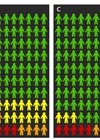The diagnostic and therapeutic landscapes of prostate cancer (PCa) have advanced at great pace in the past decade. However, disparities in access to care, clinical outcomes and representation in therapeutic, interventional and genomic studies continue to exist between Afro-Caribbean (AC) / African-American (AA) and Caucasian men [1,2]. Not only is there evidence of increased incidence of PCa in AC men (and all men of African ancestry), but there is also evidence to suggest an inherent genetic basis for racial differences in clinical outcomes in addition to more complex problems involving access to appropriate and timely treatments and screening behaviour.
Ethnicity and PCa
Not all men have equal risk for PCa, particularly of lethal disease. There are clear geographical and racial variations in PCa incidence and importantly, mortality. Men from Africa and the Caribbean have higher age-standardised mortality rates compared to Europe, with the lowest rates seen in Asia.
The PROCESS study examined 2140 cases of PCa in geographical areas with high proportions of AC residents. AC men were three times more likely to develop PCa than Caucasian men but there was no observed difference between black-African and black-Caribbean men, this being more marked in younger men [3]. An earlier population-based study of 359 men with PCa in London reported increased incidence for every age group with a threefold increased age-specific risk of PCa [4]. Data from the Office of National Statistics (ONS) shows AC men are twice as likely to die from the disease compared to Caucasians, which further highlights the importance for research and better understanding of the disease biology in this group of men [5].
Is the prognosis different?
Large population datasets have reported late presentation and higher mortality rates from PCa in AA men [6]. In a retrospective analysis of over 190,000 men from the SEER Prostate Active Surveillance / Watchful Waiting database from 2010-2015, Mahal et al. reported differences in disease-specific mortality in AA men vs. Caucasians by Gleason grade. The study found AA men were younger at diagnosis, had more Gleason 7-10 disease than their Caucasian counterparts and had a higher risk of death from Gleason 6 disease [7]. Large differences in the PCa incidence and mortality have been suggested in part to be due to differences in health-seeking behaviours and / or knowledge. Rajbabu et al. assessed 871 questionnaires, examining differences in knowledge and beliefs about PCa between white and black men in the UK. Black men’s knowledge of their increased risk of the disease and of its signs and symptoms was described as ‘poor’ [8].
“There is also evidence to suggest an inherent genetic basis for racial differences in clinical outcomes in addition to more complex problems involving access to appropriate and timely treatments and screening behaviour”
Tsodikov et al. performed a large-scale modelling study, estimating three models of PCa natural history using prostate specific antigen (PSA) screening and PCa incidence data for AA men compared to non-black ethnicities. They found racial disparity in PSA testing among AA men aged 60 and over compared to other races and concluded AA men have a higher risk of progressing to metastases or high-grade disease before clinical diagnosis than in the USA’s caucasian population. It was not possible for the models or the authors to identify what drives these differences and if they are predominantly biological / behavioural / socioeconomic or environmental [9].
Interestingly, a recent multi-cohort analysis of 306,000 men (across three large USA databases) with localised PCa reported no difference in PCa specific survival in AA men after adjusting for access to medical care, treatment, age and stage over a median follow-up period of 75 months [10]. Across all three cohorts, AA men were likely to have higher-stage disease at diagnosis. There was a significant difference however in other-cause mortality, i.e. AA men were significantly more likely to die of competing causes than Caucasians. In their unadjusted analysis, AA men had greater socioeconomic barriers to healthcare and health insurance, and had lower rates of employment and housing. In the fully adjusted model (age at diagnosis, pre-treatment PSA, Gleason score, T and N stages, type of treatment, insurance status and socioeconomic status), there was only a 0.5% absolute increased prostate cancer specific mortality (PCSM) in AC men at 10 years after diagnosis compared to Caucasian men.
The main body of epidemiological observational, retrospective data convincingly highlights consistent differences in PCa mortality based on ethnicity [11]. But analysis by Dess et al. suggests more of a nonbiological cause for the observed disparity and ‘equal treatment yields equal outcome’. Their finding after adjusting for notably standardised treatment that there was no difference in PCSM (stage-for-stage) raises the important issue of disparate access to healthcare and health insurance [10].
PSA screening in men of African ancestry
Black men remain under-represented in large PSA screening studies such as the European Randomized study of Screening for Prostate Cancer (ERSPC), Prostate, Lung, Colorectal and Ovarian (PLCO) Cancer Screening Trial and Cluster Randomized Trial of PSA Testing for Prostate Cancer (CAP); with no documented men of African ancestry in ERSPC and 4% in PLCO [12]. The UK CAP study, which evaluated the effect of low-intensity PSA screening intervention in approximately 400,000 men, did not report the ethnic makeup of its participants [13], and the ProtecT trial (which was embedded in the CAP study) reported ‘white ethnic origin’ in 98%, 99% and 99% of participants randomised to radiotherapy, surgery and active monitoring respectively [14].
What do the guidelines say?
European Association of Urology (EAU) guidance (2021) assigns ‘strong’ evidence to support a recommendation for PSA screening from age 45 in men of African ancestry. American Urological Association (AUA) guidance recommends ‘individualised’ PSA screening strategies for men at above average risk from age 40 onwards. The National Comprehensive Cancer Network® (NCCN®) early detection guidance states that it is ‘reasonable’ for AA men to consider beginning shared decision making about PSA screening annually from age 40 [15-17].
GWAS and SNP profiles
Common, low-penetrance genetic variations (single-nucleotide polymorphisms – SNPs) may confer a risk of PCa. The rollout of large scale genome-wide association studies (GWAS), has led to the discovery of up to 170 SNPs associated with prostate cancer risk across various chromosomal loci [18,19]. Most GWAS studies establishing risk SNPs, risk-prediction models using genetic information and genomic test validation (i.e. OncotypeDx / Decipher and Prolaris) have used genetic information from predominantly Caucasian men. Information regarding specific risk alleles in men of African ancestry is therefore grossly lacking, hampering the potential for ethnicity-specific genetic risk scoring.There are also issues with recruitment to investigational clinical trials in PCa treatment, with less than 3-10% of therapeutic trial participants being black compared to over 70% being of Caucasian ethnicity [20, 21], and note is made of the well-known Prostate Cancer Intervention Versus Observation Trial’s (PIVOT) success with 30% of its recruits being men of black ethnicity. The Abi Race study prospectively investigated the PSA response rate in AA men compared to Caucasians who were prescribed Abiraterone in the setting of mCRPC. They reported potentially more durable PSA responses in black men and differences in SNP profiling [22]. The Men of African Descent and Carcinoma of the Prostate Consortium (MADCaP) is crucially examining prostate cancer epidemiology, outcomes and aims to catalogue specific genetic mutations in this group of men across Africa and North America, with one participating centre in London [23].
Mutational germline and somatic profiles
A variant at 8q24 has been named as a risk-loci specific to black men with a FH of PCa [23]. Darst et al. investigated if this germline variant was enriched in men of African ancestry in approximately 9000 cases and 8500 controls (from studies of men from North America, Europe, the UK and a small amount in Barbados and the Congo). They discovered this specific risk allele to be significantly associated with earlier onset disease and more aggressive disease and estimated that in African men, the allele accounts for 32% of the total familial risk explained by all known PCa risk variants [24].
Evidence suggests the genomic landscape of PCa in the tumour tissue of men of African ancestry is different to those of Caucasians. Tonon et el. performed whole-genome-sequencing (WGS) of a small number of radical prostatectomy specimens (ISUP ≥3) in AC and Caucasian patients. They reported overexpression of androgen receptor (AR) gene activity in AC patients, a higher incidence of intrachromosomal rearrangements and differences again at the 8q24 region [25]. When Koga et al. compared tumour DNA alterations in PCa patients from four datasets comprising AC and Caucasian men they found a similar frequency of genomic alterations in select genes and microsatellite instability (MSI) status in the two groups inferring no disadvantage would be afforded to AC men if precision oncology tests based on these features were performed [26].
Predictive genomic tests and their utility
Genomic tests utilising prostate biopsy tissue such as OncotypeDx® can be used in men with low-intermediate risk disease considering active surveillance or radical treatment. The result is a ‘Genomic Prostate Score’ (GPS) of 1-100. Higher values correlate with a higher risk of adverse pathology at the time of prostatectomy, risk of 10-year prostate cancer-specific mortality and risk of developing metastases within 10 years [27]. Similarly, the Prolaris® test measures gene expression levels of 31 cell cycle genes, in RNA extracted from prostate tumour tissue. It is designed to act as a decision aid in the setting of considering active surveillance versus radical treatment in men with low / intermediate risk PC. The Decipher® test also uses prostatectomy tissue to predict the risk of five-year metastases and PCSM after radical treatment, using an oligonucleotide microarray to create a signature ‘genomic classifier’ score based on 22 genomic markers, ranging from 0-1 [28,29].
“Most GWAS studies establishing risk SNPs, risk-prediction models using genetic information and genomic test validation have used genetic information from predominantly Caucasian men”
All tests have been developed and validated in predominantly Caucasian cohorts (in a similar vein to the development and validation of PCa risk SNPs). NCCN guidance [15] recommends tests such as these to help inform decision making in men with low or favourable intermediate-risk localised PCa. However, when Creed et al. explored the gene signatures exploited by the aforementioned tests in AA men compared to Caucasians, significant racial differences were observed indicating the performance and usefulness of these tests in black men may be different to those in Caucasians [30].
Multiparametric MRI
A retrospective analysis of 661 men undergoing mpMRI found no difference in the clinically significant cancer detection rates between AA and Caucasian men, with no observed differences in the location of dominant lesions on mpMRI or in the incidence of PIRADS 4-5 lesions [31]. Henning et al. also demonstrated a similar diagnostic performance of mpMRI in (a small number) of AA men [32]. However, a difference in access to mpMRI has been shown to be negatively affected by race and equally the ability to undergo MRI fusion biopsy in African American men compared to Caucasians [33,34].
Targeted screening
Earlier PSA screening has been suggested for black men. The three different models to estimate the natural history of PCa in black men used by Tsodikov et al. [9] showed lower PSA testing in black men aged 60 and older, suggesting PSA screening may need to be three to nine years earlier for black men given the increased incidence of clinically significant disease in this population, which was also supported by a SEER analysis of survival disparities between AA men and European men [35]. However, as the limitations of PSA as a robust screening tool are well known with minimal data on its specific clinical utility in black men, novel efforts to establish the best method of early disease detection are described below in conjunction with efforts to increase our genomic knowledge of these men’s germline status and risk profiles.
The PROFILE Study
The PROFILE Feasibility study examined the role of upfront prostate biopsy regardless of PSA with a polygenic risk score (PRS) in 100 men with a presumed genetic predisposition to PCa. They reported a cancer detection rate of 25%, with 48% of these being clinically significant cancers requiring radical treatment [36]. Presently, the PROFILE study is recruiting a total of 700 subjects investigating the role of targeted screening in men with a FH of PCa and men of African ancestry. Germline genetic analysis of 130 SNPs with a resulting PRS will be correlated with outcome at upfront prostate biopsy. The aim is to recruit 350 men in each risk-group, with men declining MRI / biopsy undergoing PSA surveillance for a minimum of five years, with low-age related thresholds set for clinically ‘triggering’ a prostate biopsy. PrCa incidence, aggressiveness and the incidence of abnormal MRI and its value in this cohort will also be investigated.
Conclusion
Without timely access to appropriate treatments and the modification of socioeconomic barriers to care, men of African ancestry will remain predisposed to earlier onset of PCa, higher grade disease, with potentially worse outcomes. The causes of the observed discrepancies in presentation and outcomes are multifactorial and complex, with apparent interplay between genetic, environmental, cultural and socioeconomic factors. Efforts should focus on studies to evaluate the benefit-harm trade-off for more aggressive screening to identify an appropriate strategy for this high-risk cohort.
References
1. Sanchez-Ortiz RF, et al. African-American men with nonpalpable prostate cancer exhibit greater tumor volume than matched white men. Cancer 2006;107(1):75-82.
2. Chornokur G, et al. Disparities at presentation, diagnosis, treatment, and survival in African American men, affected by prostate cancer. Prostate 2011;71(9):985-97.
3. Ben-Shlomo Y, et al. The risk of prostate cancer amongst black men in the United Kingdom: the PROCESS cohort study. Eur Urol 2008;53(1):99-105.
4. Chinegwundoh F, et al. Risk and presenting features of prostate cancer amongst African-Caribbean, South Asian and European men in North-east London. BJU Int 2006;98(6):1216-20.
5. Lloyd T, et al. Lifetime risk of being diagnosed with, or dying from, prostate cancer by major ethnic group in England 2008-2010. BMC Med 2015;13:171.
6. DeSantis CE, et al. Cancer statistics for African Americans, 2016: Progress and opportunities in reducing racial disparities. CA: A Cancer Journal for Clinicians 2016;66(4):290-308.
7. Mahal BA, et al. Prostate Cancer-Specific Mortality Across Gleason Scores in Black vs Nonblack Men. JAMA 2018;320(23):2479-81.
8. Rajbabu K, et al. Racial origin is associated with poor awareness of prostate cancer in UK men, but can be increased by simple information. Prostate Cancer Prostatic Dis 2007;10(3):256-60.
9. Tsodikov A, et al. Is prostate cancer different in black men? Answers from 3 natural history models. Cancer 2017;123(12):2312-19.
10. Dess RT, et al. Association of Black Race With Prostate Cancer–Specific and Other-Cause Mortality. JAMA Oncology 2019;5(7):975-83.
11. Paller CJ, Wang L, Brawley OW. Racial inequality in prostate cancer outcomes – socioeconomics, not biology. JAMA Oncology 2019;5(7):983-4.
12. Oren O, et al. On the generalizability of prostate cancer studies: why race matters. Annals of Oncology 2016;27(12):2146-8.
13. Martin RM. et al. Effect of a Low-Intensity PSA-Based Screening Intervention on Prostate Cancer Mortality: The CAP Randomized Clinical Trial. JAMA 2018;319(9): 883-95.
14. Hamdy FC, et al. 10-Year Outcomes after Monitoring, Surgery, or Radiotherapy for Localized Prostate Cancer. N Engl J Med 2016;375(15):1415-24.
15. Mohler JL, et al. NCCN Guidelines Updates: Management of Prostate Cancer. J Natl Compr Canc Netw 2019;17(5.5):583-6.
16. Carter HB, et al. Early detection of prostate cancer: AUA Guideline. J Urol 2013;190(2):419-26.
17. Parker C, et al. Prostate cancer: ESMO Clinical Practice Guidelines for diagnosis, treatment and follow-up. Ann Oncol 2020;31(9):1119-34.
18. Macinnis RJ, et al. A risk prediction algorithm based on family history and common genetic variants: application to prostate cancer with potential clinical impact. Genet Epidemiol 2011;35(6):549-56.
19. Zheng SL, et al. Cumulative association of five genetic variants with prostate cancer. N Engl J Med 2008;358(9):910-19.
20. Spratt DE, et al. Disparities in castration-resistant prostate cancer trials. J Clin Oncol 2015;33(10):1101-3.
21. Wissing MD, et al. Under-representation of racial minorities in prostate cancer studies submitted to the US Food and Drug Administration to support potential marketing approval, 1993-2013. Cancer 2014;120(19):3025-32.
22. George DJ, et al. Abi Race: A prospective, multicenter study of black (B) and white (W) patients (pts) with metastatic castrate resistant prostate cancer (mCRPC) treated with abiraterone acetate and prednisone (AAP). Journal of Clinical Oncology 2018;36(18_suppl):p.LBA5009-LBA5009.
23. Consortium launches genotyping effort. Cancer Discov 2013;3(12):1321-2.
24. Darst BF, et al. A Germline Variant at 8q24 Contributes to Familial Clustering of Prostate Cancer in Men of African Ancestry. Eur Urol 2020;78(3):316-20.
25. Tonon L, et al. Mutational Profile of Aggressive, Localised Prostate Cancer from African Caribbean Men Versus European Ancestry Men. European Urology 2019;75(1):11-15.
26. Koga Y, et al. Genomic Profiling of Prostate Cancers from Men with African and European Ancestry. Clinical Cancer Research 2020;26(17):4651-60.
27. Cullen J, et al. A Biopsy-based 17-gene Genomic Prostate Score Predicts Recurrence After Radical Prostatectomy and Adverse Surgical Pathology in a Racially Diverse Population of Men with Clinically Low- and Intermediate-risk Prostate Cancer. Eur Urol 2015;68(1):123-31.
28. Ross AE, et al. Tissue-based Genomics Augments Post-prostatectomy Risk Stratification in a Natural History Cohort of Intermediate- and High-Risk Men. Eur Urol 2016;69(1):157-65.
29. Karnes RJ, et al. Validation of a Genomic Risk Classifier to Predict Prostate Cancer-specific Mortality in Men with Adverse Pathologic Features. Eur Urol 2018; 73(2):168-75.
30. Creed JH, et al. Commercial Gene Expression Tests for Prostate Cancer Prognosis Provide Paradoxical Estimates of Race-Specific Risk. Cancer Epidemiology Biomarkers & Prevention 2020;29(1):246-53.
31. Shin T, et al. Detection of prostate cancer using magnetic resonance imaging/ultrasonography image-fusion targeted biopsy in African-American men. BJU Int 2017;120(2):233-8.
32. Henning GM, et al. Diagnostic Performance of Prostate Multiparametric Magnetic Resonance Imaging in African-American Men. Urology 2019;134:181-5.
33. Hoge C, et al. Racial disparity in the utilization of multiparametric MRI–ultrasound fusion biopsy for the detection of prostate cancer. Prostate Cancer and Prostatic Diseases 2020;23(4):567-72.
34. Walton EL, et al. Barriers to obtaining prostate multi-parametric magnetic resonance imaging in African-American men on active surveillance for prostate cancer. Cancer Med 2019;8(8):3659-65.
35. Powell IJ, et al., Reducing prostate cancer racial disparity: evidence for aggressive early prostate cancer PSA testing of African American men. Cancer Epidemiol Biomarkers Prev 2014;23(8):1505-11.
36. Castro E, et al. The PROFILE Feasibility Study: Targeted Screening of Men With a Family History of Prostate Cancer. Oncologist 2016;21(6):716-22.
NOTE ON TERMINOLOGY
A wide variety in nomenclature of men of black ethnicity and / or of African descent exists in scientific literature. The terms Afro-Carribean’, ‘African American’ and ‘men of African ancestry’ aim to reflect the specific populations of men of African descent reflected in the various studies reviewed.
Declaration of competing interests: None declared.









